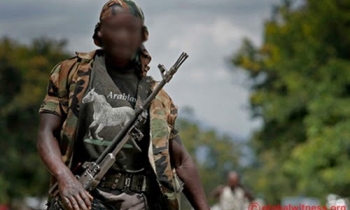The World Association of Newspapers (WAN) and the World Editors Forum (WEF) have called on African leaders, who are meeting in Ghana at the African Union Summit, to abolish "insult" laws and to accept the principles of press freedom set out in the Declaration of Table Mountain, which calls for the abolishment of all laws that restrict freedom of expression. The International Federation of Journalists (IFJ) also called on the leaders to free all journalists imprisoned on the continent as part of its ‘African Journalists out of Jail Campaign.’

"The African press is crippled by a wide array of repressive measures, from the jailing and prosecution of journalists to the widespread scourge of "insult laws" and criminal defamation," the Paris-based WAN said in a statement. "Press freedom remains a key to the establishment of good governance and durable development in Africa, to the fight against corruption, famine, poverty, violent conflict, disease and lack of education."
The Declaration of Table Mountain, issued at the World Newspaper Congress and World Editors Forum in Cape Town, South Africa, last month, calls on African governments "as a matter of urgency" to abolish all laws that restrict press freedom, to release jailed journalists, abolish draconian press laws and recognise the importance of press freedom for economic, political and social development.
“We are extremely worried about the situation of our colleagues in Ethiopia, Eritrea and The Gambia,” said IFJ Africa Office Director Gabriel Baglo just before the start of the African Union Summit in Ghana. “It’s time for urgent action, not more empty promises. We call on the Heads of State of Africa to free all the journalists imprisoned without delay.”
In calling Monday for African leaders to take action, WAN and WEF documented 229 cases of editors, journalists and other media workers who have been harassed, assaulted, beaten, arrested, detained or imprisoned in 27 African countries between January and May 2007. Of particular concern are so-called "insult laws", which make it a criminal offence to "insult" presidents and other public figures and are often used to jail government critics.
IFJ said 13 journalists are languishing in jail in Ethiopia at the Kality prison in Addis Ababa. Fifteen are held incommunicado in jail in Eritrea. In the Gambia, journalist “Chief” Ebrima Manneh was arrested in July 2006 and his whereabouts since then are unknown.
IFJ held a press conference in Ghana with African media organisations, including the Network of African Freedom of Expression Organisations, the West African Journalists Association, the Ghana Journalists Association, Media Foundation for West Africa, Centre for Research Education and Development of Rights in Africa and the All Africa Editors Forum to call for the release of their jailed colleagues.
The Declaration of Table Mountain, named for the prominent landmark overlooking Cape Town, was endorsed by the boards of the Paris-based WAN and the WEF, which represent 18,000 newspapers worldwide.
The declaration:
- calls for African governments to abolish insult laws and all other laws that restrict press freedom "as a matter of urgency";
- calls for the immediate release of all jailed journalists and the return of journalists who have been forced into exile;
- condemns the repression of African media by censorship and "the use of other devices such as levying import duties on newsprint and printing materials and withholding advertising";
- calls on governments to promote "the highest standards of press freedom" and to provide constitutional guarantees of freedom of the press;
- calls on the African Union immediately to include press freedom and independent media in the criteria for "good governance" in the African Peer Review Mechanism;
- calls on international institutions to promote progress in press freedom in Africa through such steps as assisting newspapers in legal defence, skills development and access to capital and equipment.
IFJ and allied organisations issued the following demands to the Africa Union Commission and the heads of state of Africa:
- To instantly ensure the release of all journalists and media professionals imprisoned in Eritrea, Ethiopia, The Gambia and elsewhere in Africa;
- To institute measures to end impunity for those who attack journalists and media professionals;
- To order the reopening of all media outlets closed down by governments;
- To create conditions for the return of exiled journalists to their home countries.
“The intimidation and threats to African journalists must stop,” Baglo said. “African and international media are exposing cases of harassment and persecution of journalists in many African states, which continue to make the headlines. We are calling on governments to protect journalists and ensure that they can work freely and safely.”









